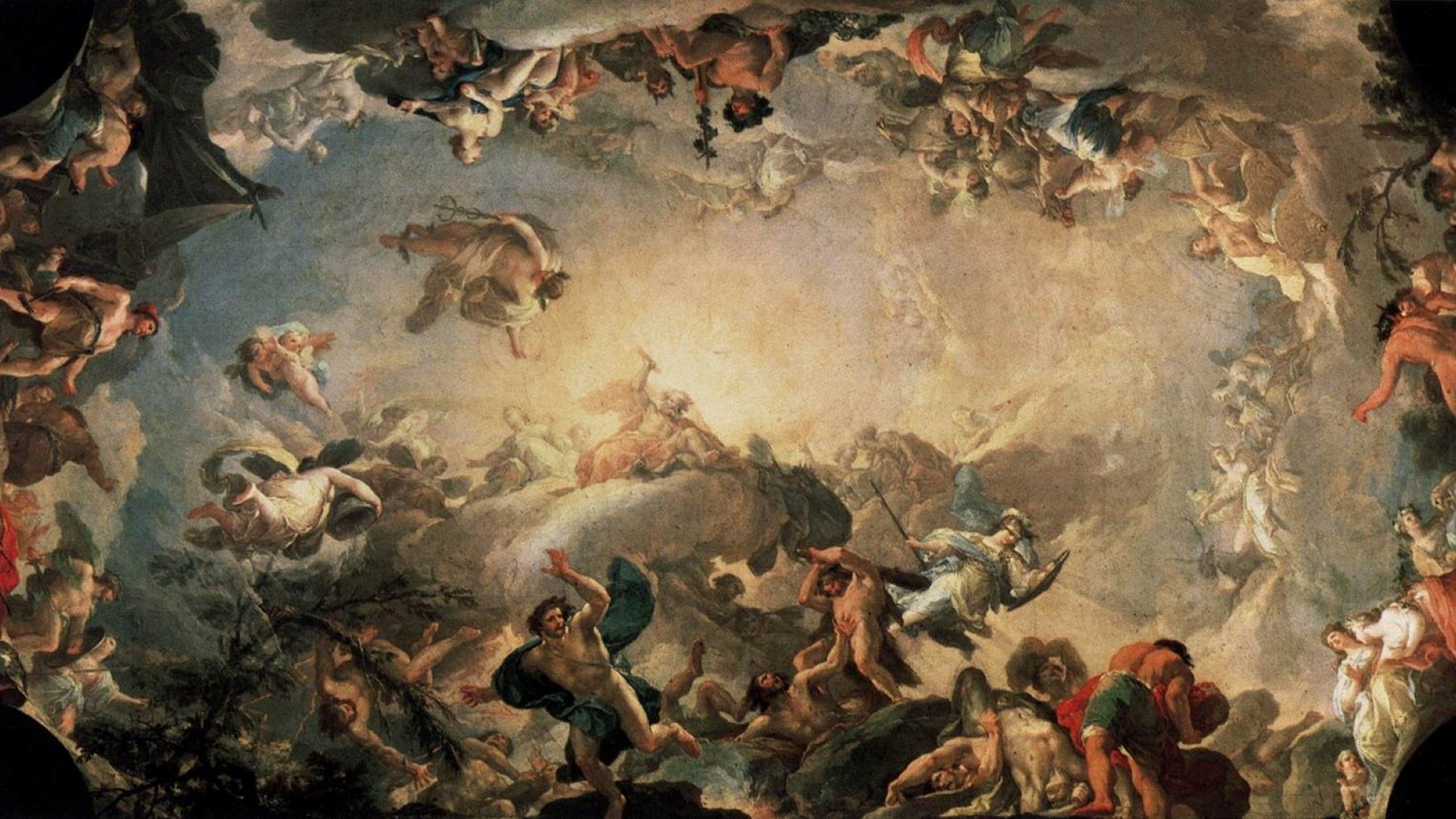
Omphale
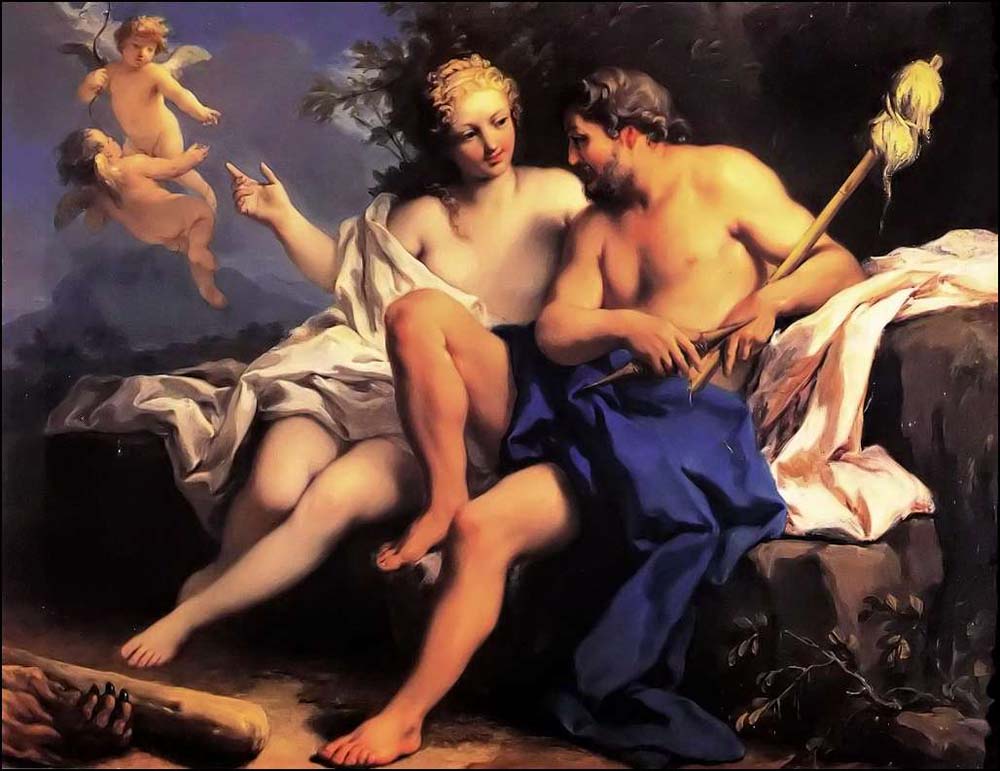
READ MORE HERE:
In Greek mythology, Omphale (Ancient Greek: Ὀμφάλη) was queen of the kingdom of Lydia in Asia Minor. Diodorus Siculus provides the first appearance of the Omphale theme in literature, though Aeschylus was aware of the episode.
The Greeks did not recognize her as a goddess: the undisputed etymological connection with omphalos, the world-navel, has never been made clear. In her best-known myth, she is the mistress of the hero Heracles during a year of required servitude, a scenario that offered writers and artists opportunities to explore sexual roles and erotic themes.
Family
Omphale was the daughter of Iardanus, either a king of Lydia, or a river-god. According to Bibliotheke (by Apollodorus) she was the wife of Tmolus, the oak-clad mountain king of Lydia; after he was gored to death by a bull, she continued to reign on her own.
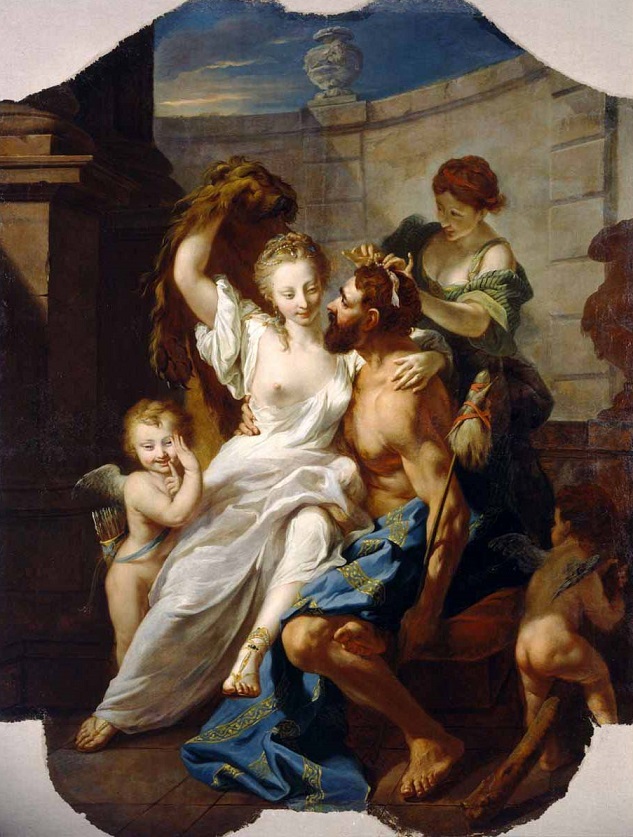
Mythology
Heracles and Omphale
In one of many Greek variations on the theme of penalty for "inadvertent" murder, for his murder of Iphitus, the great hero Heracles, whom the Romans identified as Hercules, was, by the command of the Delphic Oracle Xenoclea, remanded as a slave to Omphale for the period of a year, the compensation to be paid to Eurytus, who refused it.
The theme, inherently a comic inversion of sexual roles, is not fully illustrated in any surviving text from Classical Greece. Plutarch, in his vita of Pericles, 24, mentions lost comedies of Kratinos and Eupolis, which alluded to the contemporary capacity of Aspasia in the household of Pericles, and to Sophocles in The Trachiniae it was shameful for Heracles to serve an Oriental woman in this fashion, but there are many late Hellenistic and Roman references in texts and art to Heracles being forced to do women's work and even wear women's clothing and hold a basket of wool while Omphale and her maidens did their spinning.
Omphale even wore the skin of the Nemean Lion and carried Heracles' olive-wood club. No full early account survives to supplement the later vase-paintings.
But it was also during his stay in Lydia that Heracles captured the city of the Itones and enslaved them, killed Syleus who forced passersby to hoe his vineyard, and captured the Cercopes. He buried the body of Icarus and took part in the Calydonian Boar Hunt and the Argonautica.
After some time, Omphale freed Heracles and took him as her husband. They travelled to the grove of Dionysus and planned to celebrate the rites of Bacchus at dawn. Heracles slept alone in a bed covered with the clothes of Omphale. The Greek god Pan hoped to have his way with Omphale and crept naked into the bed of Heracles who threw Pan to the floor and laughed.
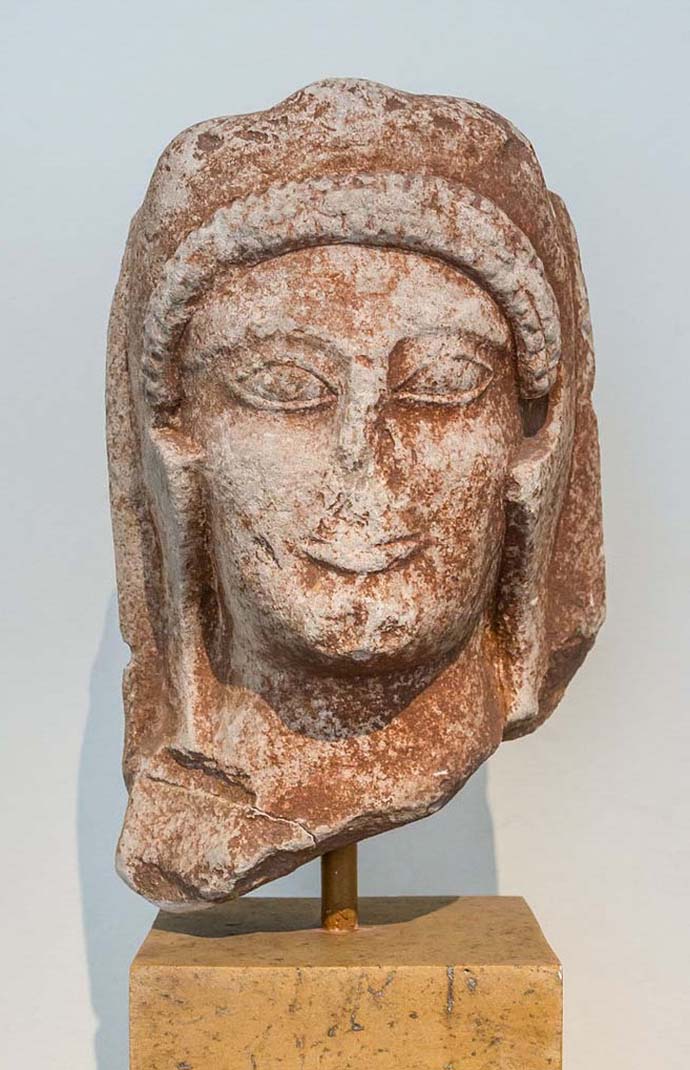
Sons of Heracles in Lydia
Diodorus Siculus (4.31.8) and Ovid in his Heroides (9.54) mention a son named Lamos. But Bibliotheca (2.7.8) gives the name of the son of Heracles and Omphale as Agelaus.
Pausanias (2.21.3) gives yet another name, mentioning Tyrsenus, son of Heracles by "the Lydian woman", by whom Pausanias presumably means Omphale. This Tyrsenus supposedly first invented the trumpet, and Tyrsenus' son Hegeleus taught the Dorians with Temenus how to play the trumpet and first gave to Athena the surname Trumpet.
The name Tyrsenus appears elsewhere as a variant of Tyrrhenus, whom many accounts bring from Lydia to settle the Tyrsenoi/ Tyrrhenians/ Etruscans in Italy. Dionysius of Halicarnassus (1.28.1) cites a tradition that the supposed founder of the Etruscan settlements was Tyrrhenus, the son of Heracles by Omphale the Lydian, who drove the Pelasgians out of Italy from the cities north of the Tiber river. Dionysius gives this as an alternate to other versions of Tyrrhenus' ancestry.
Herodotus (1.7) refers to a Heraclid dynasty of kings who ruled Lydia, yet were perhaps not descended from Omphale, writing, "The Heraclids, descended from Heracles and the slave-girl of Iardanus...." Omphale as slave-girl seems odd. However, Diodorus Siculus relates that when Heracles was still Omphale's slave, before Omphale (daughter of Iardanus) set Heracles free and married him, Heracles fathered a son, Cleodaeus, on a slave-woman. This fits, though in Herodotus the son of Heracles and the slave-girl of Iardanus is named Alcaeus.
But according to the historian Xanthus of Lydia (fifth century B.C.E.) as cited by Nicolaus of Damascus, the Heraclid dynasty of Lydia traced their descent to a son of Heracles and Omphale named Tylon, and were called Tylonidai. It is known from coins that this Tylon was a native Anatolian god equated with the Greek Heracles.
Herodotus asserts that the first of the Heraclids to reign in Sardis was Agron, the son of Ninus, son of Belus, son of Alcaeus, son of Heracles. Later writers know a Ninus who is the primordial king of Assyria, and they often call this Ninus son of Belus. Their Ninus is the legendary founder and eponym of the city of Ninus, referring to Ninevah, while Belus, though sometimes treated as a human, is identified with the god Bel.
An earlier genealogy may have made Agron, as a legendary first king of an ancient dynasty, to be a son of the mythical Ninus, son of Belus, and stopped at that point. In the genealogy given by Herodotus, someone may have grafted the tradition of a Lydian son of Heracles at the top end of it, so that Ninus and Belus in the list now become descendants of Heracles, who just happen to bear the same names as the more famous Ninus and Belus.
That, at least, is the interpretation of later chronologists who also ignored Herodotus' statement that Agron was the first to be a king, and included Alcaeus, Belus, and Ninus in their List of kings of Lydia.
As to how Agron gained the kingdom from the older dynasty descended from Lydus son of Atys, Herodotus only says that the Heraclids, "having been entrusted by these princes with the management of affairs, obtained the kingdom by an oracle."
Strabo (5.2.2) makes Atys father of Lydus, and Tyrrhenus to be one of the descendants of Heracles and Omphale. But all other accounts place Atys, Lydus, and Tyrrhenus brother of Lydus among the pre-Heraclid kings of Lydia.
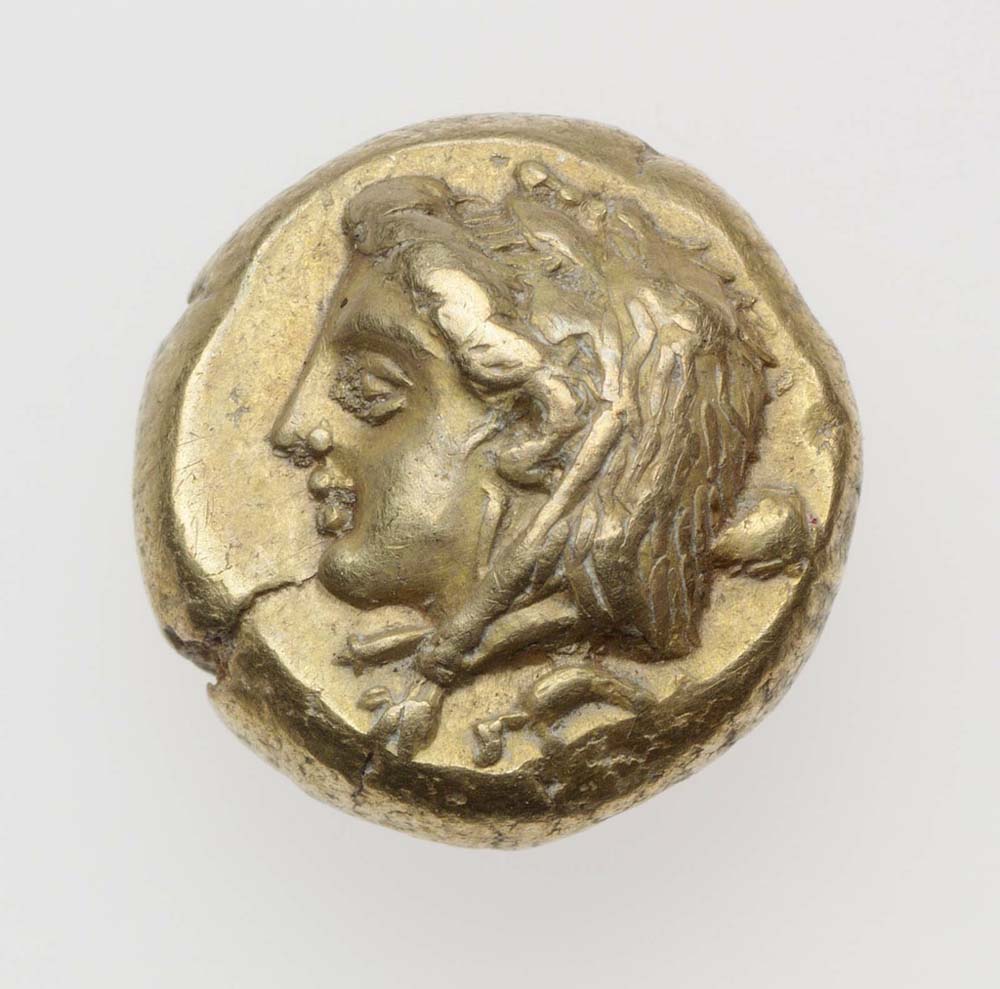
Sources
Aeschylus, Agamemnon 1024-25.
Herodotus (1975) [first published 1954]. Burn, A. R.; de Sélincourt, Aubrey (eds.). The Histories. London: Penguin Books.
Kerenyi, Karl, 1959. The Heroes of the Greeks, pp 192–97.
Sophocles, The Trachiniae 69ff.
Locker, Jesse M. (2015). Artemisia Gentileschi: The Language of Painting. Yale. p. 82.
Sophocles. The Trachiniae. 252 He says he spent a year of thraldom there slaving for the barbarian Omphale.
Lucian (Dialogues of the Gods) and Tertullian (De pallio 4) both allude to the disgrace.
Lucian. "15 Zeus, Asclepius and Heracles". Dialogues of the Gods.
Tertullian. "4.3". De Pallio..
Fasti 2.303-62.
Confessio Amantis5.6807-6960
Herodotus & de Sélincourt 1954, p. 43
Apollodorus, Bibliotheke
Diodorus Siculus, Bibliotheca historica
Ovid, Heroides
Pausanias, Description of Greece
"Wikipedia"
Our Mobile Application
Check out Our Mobile Application "Ancient Greece Reloaded"


